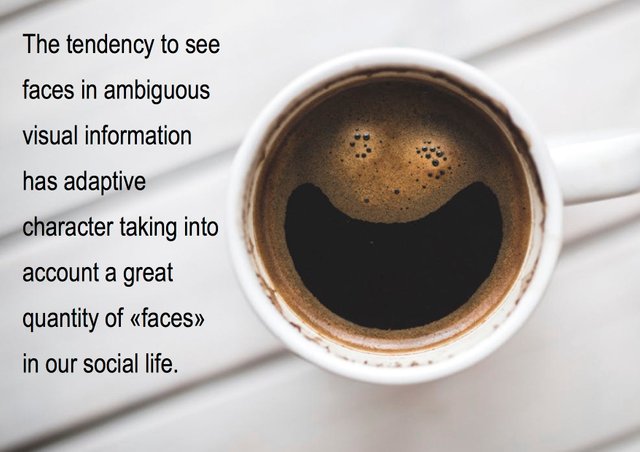
Have you ever thought about how our process of thinking functions in our heads? Why do we consider one things to be good and other bad? Why do we hope that others should behave in the way we believe is right? About these issues and much more I am going to tell you in the series of posts on «How We Think» topic.
I’m sure that knowing how our the brain functions can make it much easier understand some things and teach it useful skills. That's why I want to share the material that I have studied in the course of The Science of Everyday Thinking from the Australian University of The University of Queensland.
Today such interesting questions willl be revealed: Illusions, Naive Realism and How To Improve Thinking Process.
So, let us start!
ILLUSIONS
Stereotype Thinking
A human has a fantastic dexterity of the mind to think with patterns (stereotypes), and this is applied not only to sound but also to visual perception. Look at this picture. What is depicted on it?

Without a clue it's difficult to say, but if you find out that the name of the picture is "Dalmatian", after a couple of seconds you can figure out the outlines of a dog. And the most interesting is that once you learn that there is a dog depicted here, you will NEVER look at the picture as before, seeing only black spots. The pattern was fixed in the head.
In fact, we, people, are the "determinants" of patterns in our lives, especially, it concerns faces (smiles). There are whole sites with photos where people post objects of everyday life which resemble smileys.

The above described refers to one important concept of distortion of reality, which is called the basic cognitive error. We ALWAYS interpret the things in our heads without realizing that they can be interpreted in thousands of ways.
HOW MEMORY WORKS
The expert in the field Beth Loftus says that our brain does not remember information in the same way as a video camera does. It's not just getting data into the brain in a linear order and then reproducing it. We are talking about transforming pieces of "our experience" into a fragment of memory. The new information is superimposed on the already existing fragments in the memory, so the data merges and partly mix.
That is why sometimes information is remembered as true in the past, but, in fact, it is false (despite the fact that a person is sure of its accuracy).
In this video, Beth Loftus talks about how much reliable memory is.
NAIVE REALISM
Lee Ross, professor of social psychology at Stanford University, first introduced the notion of naive realism in the 1990s.
Naive realism is a person's inclination to believe in supposition that he perceives and sees the world objectively, and that people who disagree with him must be misinformed, irrational and not impartial.
The professor claims that the world is exactly what it seems, so it is worth bearing in mind that everything we hear, see and remember involves a considerable representation and knowledge of how the world functions. That's why everyone's reality is different.
Given this, we can not foresee the behavior of other people, since the knowledge of an individual person is based solely on his experience and can not be related to the experience of others.
EVIDENT EXPERIMENT
The experiment was conducted by Elizabeth Newton in the 1990s. In the original, this experiment can be read on the Harvard Business Review website. The main idea was that a man was tapping a melody, sounding in his head, and the audience had to guess it. How do you think, what percentage of people coped with the assignment?
Correctly! Only 2.5%. At the same time, "tapping" people predicted a 50% guessing.
Why? Because the melody passed only through the mind of the tapping individual, and for everyone else it was just a rhythm. But after people were told what kind of melody the speaker was tapping, they could no longer hear tapping without having the melody in mind.
IMPROVEMENT OF THE THINKING PROCESS
To speed up the process of learning new things, you need to do the following according to Geoff Norman, Honorary Professor at McMaster University:
- practice what you learn (apply learned material in different context, in different situations)
- remember the material, attaching it to the already known one
- take for a model experts in the required field (read about them, their methods, their advice)
- use flash cards (didactic materials with pictures, headwords, diagrams)
- contribute to a frequent «collision» with the studied topic (The more times you stumble upon a material, the more it will be remembered)
- test yourself (Ask yourself questions like: Can I summarize what I learned? Gather with your friends and discuss the relevant topic, ask each other some questions about it)
- apply the principle of distancing the material (Do not reread the material once it has been learned. Do different thing, read something else, and only after time has passed, go back to the original material)
Rereading of the learned material and its memorization give only a short-term result of memorization, since only the operative memory is involved. This phenomenon can clearly be observed in preparation for exams.
Photos are under license CC0.
This post received a 1.6% upvote from @randowhale thanks to @crazy-daisy! To learn more, check out @randowhale 101 - Everything You Need to Know!
Downvoting a post can decrease pending rewards and make it less visible. Common reasons:
Submit
Resteemed to over 4500 followers and 100% upvoted. Thank you for using my service!
Read here how the new bot from Berlin works.
@resteem.bot
Downvoting a post can decrease pending rewards and make it less visible. Common reasons:
Submit
😁😁 Ты попала в зону моей компетенции! Я эти аспекты изучаю на физико химическом поле. Для развития мозга я жонглирую, играю в нейронейшн, изучаю языки, ну и целый ряд веществ принимаю, о которых пока промолчу. СУПЕР. СПАСИБО 😍😘😗😙😚
Downvoting a post can decrease pending rewards and make it less visible. Common reasons:
Submit
ОГО!!!! Круть какая!!!! :) Какая ты молодец!! Жонгляж - это же суперская тема! (Правда я сама не умею :))) но другими всегда восхищаюсь!
Downvoting a post can decrease pending rewards and make it less visible. Common reasons:
Submit
@originalworks
Downvoting a post can decrease pending rewards and make it less visible. Common reasons:
Submit
Your post was very interesting! It's funny people interpret stimuli according to their own experiences. It's as if reality can never be viewed objectively, it is out there, impartial, unbiased, but we cannot access it, because we see it from a very specific perspective.
Downvoting a post can decrease pending rewards and make it less visible. Common reasons:
Submit
This is completely true! I wish everybody could know this and maybe in such a way there could be more understanding between people.
Downvoting a post can decrease pending rewards and make it less visible. Common reasons:
Submit
Thanks to provide Great New and Useful Information
Downvoting a post can decrease pending rewards and make it less visible. Common reasons:
Submit
This post has received a 2.55 % upvote from @lovejuice thanks to: @crazy-daisy. They have officially sprayed their dank amps all over your post rewards. GOOD TIMES! Vote for Aggroed!
Downvoting a post can decrease pending rewards and make it less visible. Common reasons:
Submit
This post was resteemed by @resteembot!
Good Luck!
Curious? Check out:
The @resteembot users are a small but growing community.
Check out the other resteemed posts in resteembot's feed.
Some of them are truly great.
Downvoting a post can decrease pending rewards and make it less visible. Common reasons:
Submit
Congratulations @crazy-daisy! You have completed some achievement on Steemit and have been rewarded with new badge(s) :
Click on any badge to view your own Board of Honor on SteemitBoard.
For more information about SteemitBoard, click here
If you no longer want to receive notifications, reply to this comment with the word
STOPDownvoting a post can decrease pending rewards and make it less visible. Common reasons:
Submit
This wonderful post has received a bellyrub 0.16 % upvote from @bellyrub thanks to this cool cat: @crazy-daisy. My pops @zeartul is one of your top steemit witness, if you like my bellyrubs please go vote for him, if you love what he is doing vote for this comment as well.
Downvoting a post can decrease pending rewards and make it less visible. Common reasons:
Submit
Congratulations @crazy-daisy, this post is the ninth most rewarded post (based on pending payouts) in the last 12 hours written by a User account holder (accounts that hold between 0.1 and 1.0 Mega Vests). The total number of posts by User account holders during this period was 1176 and the total pending payments to posts in this category was $2415.45. To see the full list of highest paid posts across all accounts categories, click here.
If you do not wish to receive these messages in future, please reply stop to this comment.
Downvoting a post can decrease pending rewards and make it less visible. Common reasons:
Submit
Thank u for the information!
Downvoting a post can decrease pending rewards and make it less visible. Common reasons:
Submit
A fun exercise is to try and guess what your next thought will be. . Its not possible. . .
Downvoting a post can decrease pending rewards and make it less visible. Common reasons:
Submit
:D Yes, I think that it is impossible as well.
Downvoting a post can decrease pending rewards and make it less visible. Common reasons:
Submit
Really liked this post! Re-steemed!
Downvoting a post can decrease pending rewards and make it less visible. Common reasons:
Submit
Thank u!
Downvoting a post can decrease pending rewards and make it less visible. Common reasons:
Submit
This post was resteemed by @resteembot!
Good Luck!
Curious? Check out:
The @resteembot users are a small but growing community.
Check out the other resteemed posts in resteembot's feed.
Some of them are truly great.
Downvoting a post can decrease pending rewards and make it less visible. Common reasons:
Submit